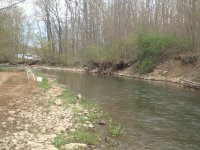SirJohnny
New member
- Joined
- Oct 24, 2006
- Messages
- 25
Frankstown Branch - Major Landowner Dispute (4/16/2017)
All:
Ran into a rather irate landowner and his wife on the Frankstown Branch of the Juniata. Usually, I try to keep my fishing locations a secret on Facebook, but this needs to be told and there is a gigantic safety issue.
I have the Pennsylvania State Police involved (they came out to the stream), as well as the PA Fish Commission - District Supervisor.
Gentleman pulled a gun on another angler this afternoon and chased him down the stream (this was reported to me by the angler, and I did not see).
Gentleman threatened to get his gun and "shoot" me. I advised him to call the PA State Police (which he did). Landowner's wife then physically bumped her chest into me several times, screaming and yelling. I did not see any gun during my confrontation with these folks.
These folks attempted to keep me from passing through their section/property via the stream (I was in the stream the entire time).
An officer Kline from the PA State Police later arrived on the scene and interviewed me and took my information. Landowner wishes to press charges. Officer did not know stream laws, and would have to check with Fish Commission and others.
I fully expect to receive either a citation or court summons later this week or sometime next.
The gentleman has both sides of the stream posted. I believe the other side borders I-99 and might be Penn Dot property (but don't know).
If you look at the picture, you can see where he has run a bulldozer down to the edge of the stream and is actually moved ground in an area that gets regularly flooded. I am not sure if he actually bulldozed the stream bottom. This was reported to the PAFBC this afternoon.
.------
Here's what I do know. The entire Frankstown Branch and several named tributaries were declared navigable back in the 1700s. The text cited, is the same used for the Little Juniata vs. Donny Beaver case, in which the Pennsylvania anglers prevailed.
Remember, the Frankstown Branch was home to the Portage Railroad back in the 1800's. Lots of remnants exist with respect to the old canal lock and dam system from that time period.
----------
I am fully prepared to legally challenge this gentleman. I am also prepared to file civil suit regarding the threat (from both him and his wife) regarding the use of firearms, and illegally interfering with a person legally engaged in the act of fishing in Pennsylvania.
Just wanted to give a heads up ... as this could get ugly, and don't want to see anyone get hurt on the stream. This gentleman and his wife are mentally unstable and I am afraid he will result to using firearms if necessary.
Please post to other groups/discussion boards/where ever. Please feel free to use my name.
Sincerely,
John Coxey
(Altoona, PA)
Photo shows area of dispute.
All:
Ran into a rather irate landowner and his wife on the Frankstown Branch of the Juniata. Usually, I try to keep my fishing locations a secret on Facebook, but this needs to be told and there is a gigantic safety issue.
I have the Pennsylvania State Police involved (they came out to the stream), as well as the PA Fish Commission - District Supervisor.
Gentleman pulled a gun on another angler this afternoon and chased him down the stream (this was reported to me by the angler, and I did not see).
Gentleman threatened to get his gun and "shoot" me. I advised him to call the PA State Police (which he did). Landowner's wife then physically bumped her chest into me several times, screaming and yelling. I did not see any gun during my confrontation with these folks.
These folks attempted to keep me from passing through their section/property via the stream (I was in the stream the entire time).
An officer Kline from the PA State Police later arrived on the scene and interviewed me and took my information. Landowner wishes to press charges. Officer did not know stream laws, and would have to check with Fish Commission and others.
I fully expect to receive either a citation or court summons later this week or sometime next.
The gentleman has both sides of the stream posted. I believe the other side borders I-99 and might be Penn Dot property (but don't know).
If you look at the picture, you can see where he has run a bulldozer down to the edge of the stream and is actually moved ground in an area that gets regularly flooded. I am not sure if he actually bulldozed the stream bottom. This was reported to the PAFBC this afternoon.
.------
Here's what I do know. The entire Frankstown Branch and several named tributaries were declared navigable back in the 1700s. The text cited, is the same used for the Little Juniata vs. Donny Beaver case, in which the Pennsylvania anglers prevailed.
Remember, the Frankstown Branch was home to the Portage Railroad back in the 1800's. Lots of remnants exist with respect to the old canal lock and dam system from that time period.
----------
I am fully prepared to legally challenge this gentleman. I am also prepared to file civil suit regarding the threat (from both him and his wife) regarding the use of firearms, and illegally interfering with a person legally engaged in the act of fishing in Pennsylvania.
Just wanted to give a heads up ... as this could get ugly, and don't want to see anyone get hurt on the stream. This gentleman and his wife are mentally unstable and I am afraid he will result to using firearms if necessary.
Please post to other groups/discussion boards/where ever. Please feel free to use my name.
Sincerely,
John Coxey
(Altoona, PA)
Photo shows area of dispute.




